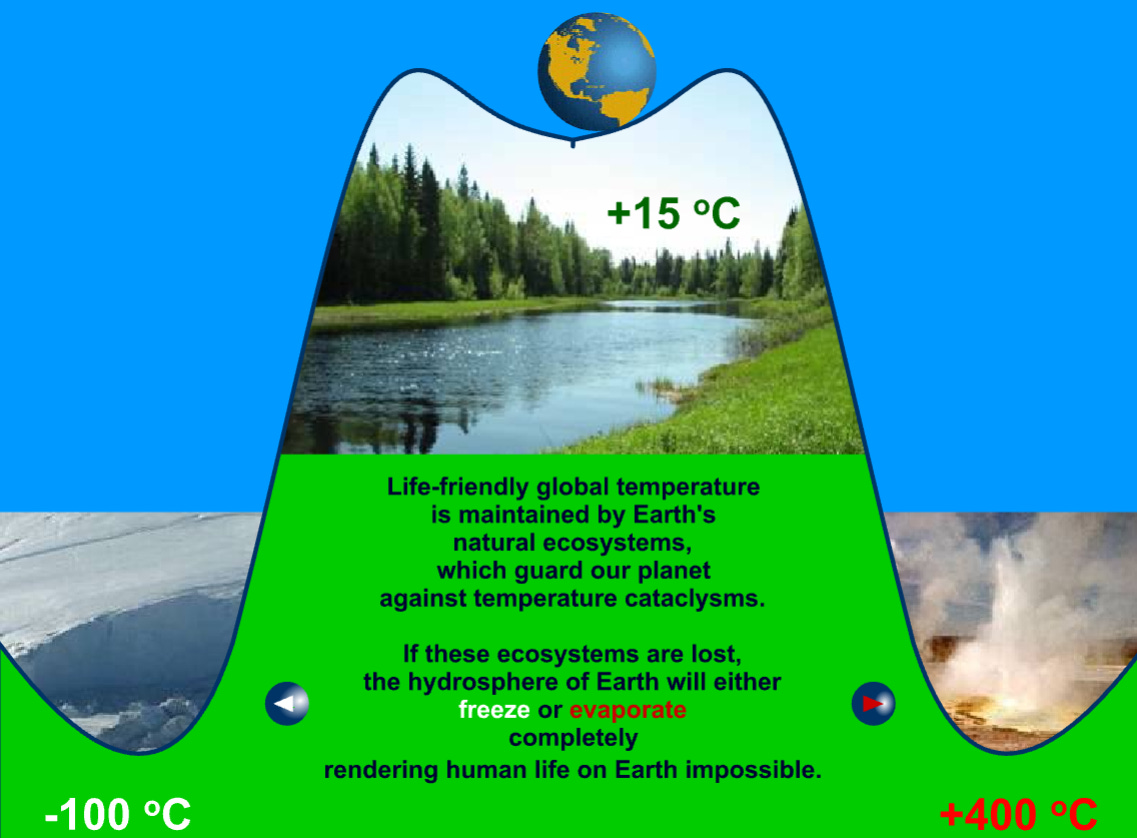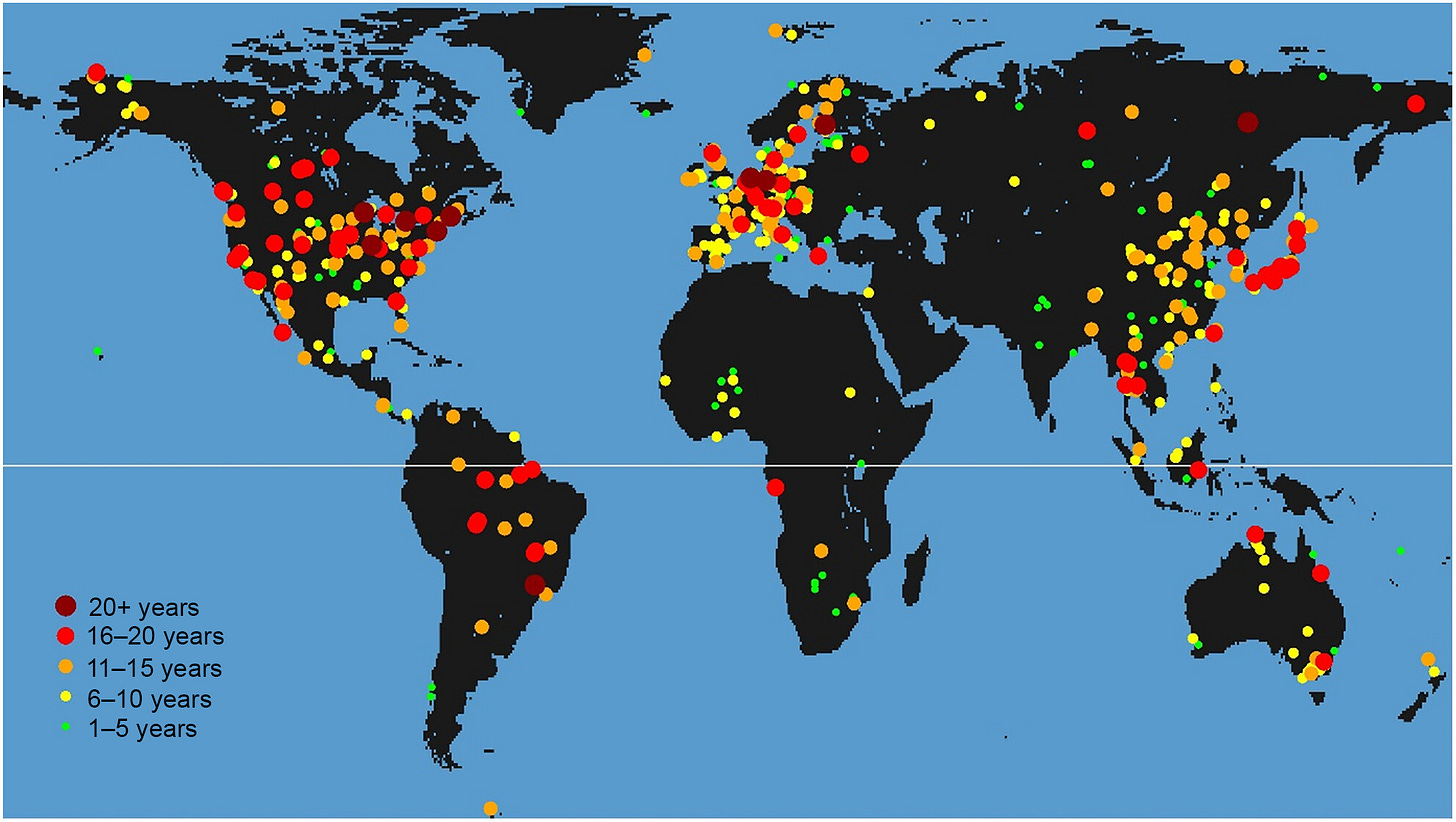As the New Year 2025 opens its horizons, please allow me to offer a few thoughts for discussion. The concept of biotic regulation provides a distinct perspective on why we need wilderness. There is the carbon-centric view: we believe that we need trees to absorb CO2 from the atmosphere. Strictly speaking, this view is not about wilderness or nature at all, because its logical extension is to cut down trees (understood as “carbon sticks”) and bury or burn them to make room for new sticks.
Another view is that we need wilderness to maintain biodiversity, the number of species on Earth. This view has its own controversies. If you take boreal and temperate forests, for example, they don’t have as many species as tropical forests. We can safely conserve all of their species locally, say, in Scandinavia. Does that mean that the remaining wilderness in the boreal forests doesn’t need to be protected?
The proposition stemming from the biotic regulation concept is that we need to protect natural self-sustaining ecosystems in an area sufficient for them to perform their climate-regulating function on a regional and global scale. That is to say, we should not protect wild nature as an ecological museum. We should protect wild nature as a working mechanism for climate stabilization. It is important to note that since we do not quite understand how the climate system works, we must assume that natural ecosystems will work most efficiently when left without our intervention. We can in no way improve their functioning.
To visualize this idea, imagine that the Earth can have several climate states, not all of which are equally favorable to modern life. With environmental regulation by natural ecosystems, the Earth sits comfortably around 15 degrees Celsius as a global average surface temperature. There is a safe potential pit in this temperature range.
As we disrupt natural ecosystems and impair their climate regulation function, the pit becomes shallower and eventually disappears. If we also add CO2, which pushes the Earth toward a warmer state, we could see a sharp and unfavorable increase in global average surface temperature.
The scenario shown in the above two graphs is certainly radical*, but it conveys the concept of why we need wilderness, and how much of it. We need enough wilderness to provide sufficient stability for all the environmental parameters we care about. In simple words, to ensure that the potential pit of our existence is comfortably deep and favorably situated in the parameter space. (E.g., precipitation in a desert can be stably near zero, but this is not the type of stability that we would appreciate.)
Of course, it is not just about temperature and precipitation. It is, in the words of Chuck Pezeshki, an ultra complex multidimensional optimization problem. Natural ecosystems simultaneously optimize biological productivity, temperature, humidity, precipitation, cloud cover, continental moisture transport, soil moisture, nitrogen, phosphorus and other critically important biogens, and they also stabilize themselves against internal disruptions (like deadly insect outbreaks).
This last aspect provides clues to the priorities of protection. All ecosystems that are still capable of self-regeneration must be protected from our exploitation as much as possible. Stop taking from them. They are our gold standard, our ultimate treasure. Efforts to define this important concept of ecosystem self-sustainability, for which we do not even have a suitable expression, are ongoing. We hear about stable forests and high-integrity forests, and in terms of strategies, the outstanding concept of proforestation has recently been formulated. To this intellectual quest, the biotic regulation concept adds the perspective of scale: we need natural ecosystems to do their job of regulating the climate massively around the globe.
So why is protecting natural ecosystems not a major focus of climate negotiations? One reason for our archaically primitive views on ecosystem functioning is that our ecological knowledge is heavily biased toward systems that are severely disturbed by human activity. Such systems are inherently unstable themselves and obviously do not stabilize the environment and climate.
Let us have a look. The graph below depicts the extant intact forests that show no sign of human interference during the satellite era. For what they are worth, these are our proxies for natural self-sustainable forests.
The second graph shows the distribution of flux towers that measure important atmospheric processes and parameters including evaporation, transpiration and transport of tracers like CO2 or biogenic aerosols.
We can see that the vast majority of measurements (translated into the vast majority of publications and the vast majority of students doing their Phd theses about) are made outside the regions occupied by natural forests in areas profoundly transformed (degraded) by anthropogenic activities. I would like to highlight one of the very few points in Siberia (Zotino, the red dot), which Andrei Nefiodov and I visited in 2020. This flux tower is situated in an area surrounded by secondary forests disturbed by clearcuts and legacy fires (see this paper about legacy fires and this one about fire-related landscape traps). Here is a typical view of forests surrounding the tower:
Compare this to an undisturbed boreal forest:
(Photo courtesy of Alexei Aleinikov, the forest did not burn for several hundred (!) years).
The third map below is from a recent global study of ecosystem resilience. It speaks for itself. We do not study natural, self-sustainable, resilient ecosystems. We have excluded them from consideration.
It is like if some aliens were studying human health, and the very capacity of humans as living beings, from inside a big hospital. After studying the patients suffering from various serious diseases, the aliens would conclude that humans are fragile creatures totally dependent on the external supply of medicine and intellectually quite uneventful. They would hardly figure out that humans are able to discover the laws of nature and perform ambitious environmental transformations on their basis. They could deduce very little about the human capacity to create art and would not believe that the best of classical music could have been composed by those strangely morbid apes. Indeed, when we are ill or humiliated, we are far from our best.
Unfortunately, our knowledge about natural ecosystems is similarly heavily distorted. We greatly underappreciate them. Historically, our misconceptions about how natural ecosystems work are so deeply ingrained that we don’t even recognize, let alone understand the importance of, the counter-evidence when by any chance we do stumble upon it. I’ll discuss some conspicuous examples on another occasion. (In passing, I note that seeing the truth in this chaos requires a viewpoint from outside this chaos. Lovelock had such a viewpoint of a space scientist. Gorshkov had such a viewpoint of an outstanding theoretical physicist who additionally spent years in untouched wilderness.)
Here I would like to conclude by listing three goals that I consider worthy of discussion and implementation:
1. Elevate protection of the remaining self-sustainable natural ecosystems, on land and in the ocean, to a top priority in the international climate change mitigation agenda.
If we lose their climate-regulating potential, we are doomed to a global environmental collapse even under the “zero emissions” scenario.
2. Restore biological productivity on degraded lands, to lessen the anthropogenic pressure on the remaining self-sustainable natural ecosystems.
The climate-regulating potential of the ecosystem cannot be maximized simultaneously with its economic potential. The ecosystem resources expropriated by humans are diverted from the regulatory processes that become less and less effective.
3. Launch a focused global effort to study the climate-regulating potential of natural ecosystems including
•soil carbon dynamics
•ecosystem impact on, and control of, cloud cover
•ecosystem impact on, and control of, local temperature regime
•ecosystem mediation of the atmospheric moisture transport
as dependent on the degree of ecosystem disturbance.
Recognize ecosystem disturbance as a key dimension in the studies of biota-environment interactions. Quantify salient differences in environmental responses of intact versus managed (disturbed, exploited) ecosystems.
To summarize, natural ecosystems are powerful mechanisms of climate stabilization. If we exploit them more, their regulatory function is impaired adding to climate destabilization, including water cycle calamities. Curbing the on-going exploitation of natural ecosystems is feasible and represents a vital part of strategies to mitigate global change.
Words make sense only within the framework of their language. If a language dies, words lose their meaning. In the four-billion-year journey of Life, our civilization is a new word, and wild nature is the primordial language. If we lose our ground base — the wild nature, our civilization will become a chimera, a sand castle that will not last long.
*For interested readers, I discussed how these stability graphs relate to the planetary boundaries in my recent talk at the EcoSummit “Eco-Civilization for Sustainable and Desirable Future” in China (slides here).











Excellent encapsulation of your thinking. And I agree we need new language to conceptualize these things. Terms that come to minds are biotic intelligence, biotic capacity and biotic integrity. The last phrase, biotic integrity, seems increasingly important. Integrity gets beneath the quantitative, referring more to the quality of an ecosystem. Rather than "good" being based on quantities of carbon, species or some other variable, it refers to how well the ecosystem retains its natural function and memory.
There seems an ingrained tendency in science to dismiss the intelligence and capability of natural beings and systems, and now the climate threat is being used to argue for more human intervention in forests, arguing that natural forests are somehow incapable of coping with changes in the climate, despite having survived massive climate fluctuations across hundreds of millions of years, and need "proactive management."
Thanks for championing biotic regulation. My this be the year it gains the recognition it deserves.
Excellent article. I agree with you that a healthy forest can be more resilient than is usually thought. In the area where I live, in the southeast of Spain, the climate is semi-arid. For most phitosociological studies, the potential vegetation of this area must be similar to the current one, made up of xerophytic shrublands. However, medieval historical texts speak of leafy forests (mainly pines and oaks) with a climate similar to that of our time. And when traveling through these landscapes you can find scattered stands that seem to be survivors of a more forest-like past. I believe that the forest has the capacity to grow where a scattered tree would not grow.